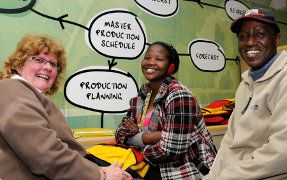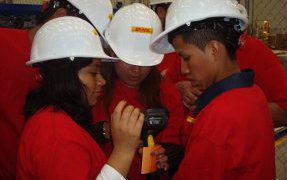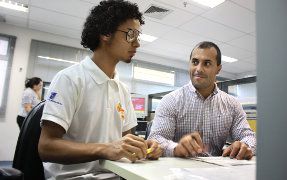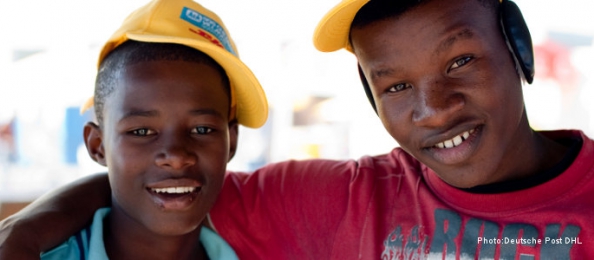Building Bridges to a Brighter Future
Deutsche Post DHL has been partnering with SOS Children’s Villages since 2011 in an initiative to help disadvantaged young people bridge the gap to the world of employment. In Brazil, one of the original four pilot countries, the program has flourished by employing a unique approach in which local DHL employees from all levels volunteer their time in hands-on workshops to tutor and mentor youth from the favelas. This not only provides inspiration and role models for the kids, but is also a valuable and eye-opening experience
for the employees. The initiative has been so successful that it has spread to 14 countries, with another 10 to be added during 2014, and more on the horizon.
Ariel, 15, nervously tells the group of her dreams of one day becoming a biologist. She is one of two dozen young people gathered in the DHL meeting room in São Paulo, all of whom come from disadvantaged
or broken families in the surrounding favelas, or slums. Anyone who grows up on the periphery of São
Paulo tends to learn early in life that dreams are quickly shattered. Two-thirds of all children in the favelas quit school before they graduate, often because the pressure to support the family is high. So, too, is the probability that the lack of a high school diploma will lead to a vicious cycle of unemployment, violence, and criminality.
After moving from a broken home to the SOS Children’s Village of Rio Bonito and joining the program it runs in partnership with DHL’s GoTeach initiative, Ariel has gained the courage to dream about a promising future. Thanks to the DHL employees who volunteer their time to teach and mentor young people like Ariel,
she has the spirit to defy the odds and is working hard to break free from the clutches of poverty and pursue her dreams.

Partnership of hope
Deutsche Post DHL entered into a partnership with SOS Children’s Villages in order to build bridges to the world of professional employment for young people like Ariel. Every young person in that room in São Paulo made the choice to be there each Saturday morning – just like the DHL employees who volunteer
to mentor and teach these teens.
Over a period of 12 weeks, the DHL volunteers help to prepare these young people for professional life. Career planning is on the agenda, along with an overview of DHL and its three business units, as well as such fundamentals as mathematics and Portuguese. These are people such as Cindy Haring, CEO of the Global Forwarding Division in Brazil, who has been on site every Saturday for the last three years to help these kids, teaching them life skills and being there to support them. This commitment is a reflection of her
conviction that it takes more than just talk to make a difference – you have to take action and do something about it.
Domingos Ramos is another example of the DHL volunteers spending their Saturday mornings here. He is familiar with the difficulties that the participants are facing – from personal experience. Like many other Brazilians, he came to São Paulo with his family in the 1960s as an economic refugee from the drought-stricken northeastern part of the country and has had to work hard to rise up out of poverty. He feels strongly that, through GoTeach, he can make a difference in the lives of these young people, admonishing them to “Study and try as hard as you can! It’s up to you!”
SOS Children‘s Villages is an independent, non-governmental, social development organization that provides family-based care for children and young people in 133 countries and territories. It advocates for the concerns, rights, and needs of children, especially those without parental care. More than 82,000 children and young people live in about 550 SOS Children’s Villages and more than 600 youth facilities around the world.
SOS Children’s Villages adheres to the principle that every child grows best in a family environment, with caring parents or caregivers, living together with their siblings, in a place they can call home. SOS Children’s Villages works with communities, local partners, and authorities to support disadvantaged families across the world, thus preventing family breakdown.
For more information, please visit: www.sos-childrensvillages.org
Maximizing impact
At DHL, our corporate citizenship activities are designed for effective, longterm impact and are an integral part of our corporate strategy. Through our GoTeach program, we strive to achieve long-term improvements in educational opportunities and employability for young people worldwide. With GoHelp, we help advance disaster management practices at airports in disaster-prone regions. And, through GoGreen, we help to reduce CO2 levels and protect the environment. We also provide support to local environmental protection and community service projects initiated by our employees.
Recently, we embarked on a process to streamline and redefine our corporate citizenship activities, to give them a more strategic framework, as well as to boost employee involvement. We rely on our employees and on partner organizations to be able to carry out these programs and maximize their impact. Our employees
are the ones who dedicate their time, experience, and enthusiasm to actually implement the activities. And
we always need to have an experienced partner in these activities – normally a specialized nongovernmental organization – because we are not the experts in specific social cases, they are.
Our corporate citizenship activities also help create sustainable business success for our company. This is because we always make sure that, whatever we do in corporate citizenship, it involves a social case and a business case. This is more than just about charity and giving money – we try to leverage the assets we have as a company, including, first and foremost, our people.
As part of our new approach, we will also start measuring our corporate citizenship activities this year in order to make them more transparent. The aim is to gauge the impact of all our corporate citizenship ctivities across the globe.
GoTeach reflects our commitment to improving educational opportunities for young people and preparing them for the working world. Our goal is to support children and young people from all socioeconomic backgrounds to develop their potential and access new opportunities for their career
development. Working in close cooperation with our partners, SOS Children’s Villages and Teach For All, our employees volunteer their experience, knowledge, and time to provide young people with support and insights into the working world.
GoTeach Brazil
GoTeach Brazil was launched as a pilot project in São Paulo, Brazil, in 2011. More than 60 young people have “graduated” from the program so far – some of them even found their first job at DHL when the program ended. The others received assistance with their job search. Not one of the participants quit school. At the moment, the selection process for the fourth year has been completed and the program will get underway in May 2014.

Personal involvement
From the start of our partnership with SOS Children’s Villages, we wanted to take a different approach than the typical corporate citizenship program by interacting directly with the beneficiaries of the scheme. This was something new for SOS Children’s Villages – at first, they were hesitant to give us direct access to these vulnerable young people.
However, we were able to demonstrate to SOS Children’s Villages how the opportunity to interact directly with DHL volunteers, see their working environments, and learn from their different experiences would benefit the youth in the program. The example of Brazil demonstrates the beauty of this concept. We employ a workshop environment in which the young people, aged 15–20, meet with DHL employees from different
job profiles, levels, and backgrounds at DHL sites, working together every Saturday morning for some 12 weeks on issues that will help them become more employable. They learn social skills such as appropriate behavior and dress in a company environment, as well as practical skills such as using computers
and other office machinery, along with business Portuguese, and even basic math proficiency.
But even more important than these skills – and what makes this program so powerful – is the direct interaction with the DHL people. Just based on their experiences, our employees are natural mentors when it comes to the process of entering professional life. They themselves have applied for jobs, they hire young people, and they are familiar with the systems of education and career development in their respective
countries. Our people on the ground in Brazil are almost 100 percent Brazilian nationals, many of whom have managed to overcome the same challenges that these young people are now facing, and to build a career at DHL.
Our people are authentic role models for these youth when it comes to employability in Brazil. As soon as they start sharing their experiences – of how they got there, who helped them, what mistakes they made, and what they learned – the kids in the room listen intently, because that is their most valuable arningexperience. The young participants learn that they can break the cycle of poverty, get a full-time job that allows them to support their families, and one day be able to send their own kids to school, giving them the best possible chance at a better future.
This is why it is vital to involve people from different levels in the company. We have learned that every employee at DHL – from top managers to middle management, to delivery drivers and warehouse echnicians – has something valuable to contribute.
This also provides a unique opportunity for our employees, as well, giving them the opportunity to expand their own horizons and improve their own social skills in the process. In Brazil, for instance, there is normally very little contact between the social classes, and we are building a bridge across this social divide. Our people in Brazil tell us that this is very eye-opening for them.

Taking root, spreading far and wide
SOS Children’s Villages, one of the key partners of the DHL GoTeach program, is active in more than 130 countries and is almost as global as Deutsche Post DHL. When the partnership was launched in 2010, we started in four countries – Brazil, Madagascar, South Africa, and Vietnam – and developed a collaborative model, working on the issue of employability for young people aged 15-25. We then added Mexico, Kenya and Ghana to the partnerships.
Constantly looking to grow the program and increase its impact, we doubled the number of countries to 14 in 2013. More than 700 employees devoted more than 10,000 hours of their time to our partnership with SOS Children’s Villages. As a result, approximately 1,200 young people in the 14 partner countries received support through 120 different activities. This rate of expansion was only possible because people from the
business units have stepped in to launch these programs – we simply wouldn’t be able to run so many programs from headquarters.
In 2014, after four years, we have a pretty good feel for this – what the levers and the dos and don’ts of the partnership are – and plan to add up to 10 more countries this year. In fact, we will encourage our employees in all countries where SOS Children’s Villages is active to think about starting a relationship on
a national or local level. We will provide the concept and business model of the partnership, and encourage our people to join in and support the overall mission of the partnership, which is fostering employability of young people coming from disadvantaged backgrounds.
How the local teams tackle the issue of employability in each country is left completely up to them, resulting in a huge variety of different programs and activities. But they are consistently tailored to the needs of the youth and the opportunities available to them in the individual countries, and are designed to involve as many DHL people as possible from all levels. They also all address the same key issues: soft skills, wider job-profile orientation, and first-hand experience in a professional working environment.
We are very proud about how this has taken root and is growing, as well as of the commitment shown by our employees in Brazil and in so many other countries. We hope to see many more follow their lead in future.
Corporate citizenship at Deutsche Post DHL
For us, “Living Responsibility” means assuming an active role in society. It means putting our strengths and core competencies to work – not only to further our own business success as a mail
and logistics services group, but to address the social challenges we face around the world today. Our corporate citizenship activities are designed for effective, longterm impact, and are an integral part of our corporate responsibility strategy. Through our GoTeach program, we help achieve longterm improvements in educational opportunity and employability for young people worldwide. With GoHelp, we help advance disaster management practices at airports in disaster-prone regions. We also provide support to local environmental protection and community service projects initiated by our employees.
Deutsche Post DHL
Living Responsibility
| Initiator | Deutsche Post DHL |
| Project start | 2011 |
| Status | ongoing |
| Region | worldwide |
| Contact person | Ralf Duerrwang |
| Awards | - |
| Anti-Corruption | - |
| Business & Peace | - |
| Development | X |
| Environment | - |
| Financial Markets | - |
| Implementing UNGC Principles in your Corporate CSR Management | - |
| Human Rights | X |
| Labour Standards | - |
| Local Networks | - |
| Advocacy of global issues | X |
| Business opportunities in low income communities/countries | - |
| Project funding | - |
| Provision of goods | - |
| Provision of services/personal | - |
| Standards and guidelines development | - |
Deutsche Post AG, operating under the trade name Deutsche Post DHL, is a German courier company and the world's largest. With its headquarters in Bonn, the corporation has 467,088 employees (FTE 421,270) in more than 220 countries and territories worldwide and generated revenue of €56.63 billion in 2010. Deutsche Post is the successor to the German mail authority Deutsche Bundespost, which was privatized in 1995. Currently, 21% of its shares are held by the state-owned KfW bank, 79% are freely floating; 65.6% of which are held by institutional and 13.4% by private investors. Since its privatization, Deutsche Post has significantly expanded its business area through acquisitions. Deutsche Post is listed in the Euro Stoxx 50 stock market index.
Source: Wikipedia
Write a comment about this page
Your comments are provided by your own free will and you take sole responsibility for any direct or indirect liability. In order to maintain the highest discussion quality, all comments will be reviewed by our editors. You hereby provide us with an irrevocable, unlimited, and global license for no consideration to use, reuse, delete or publish comments in accordance with our Community Guidelines.
0 Comments
About Us // Privacy Policy // Copyright Information // Legal Disclaimer // Contact
Copyright © 2012-2018 macondo publishing GmbH. All rights reserved.
The CSR Academy is an independent learning platform of the macondo publishing group.









